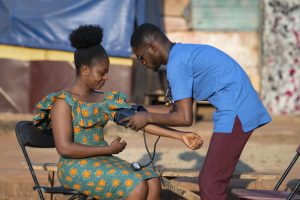
Dr. Frankline SEVIDZEM WIRSIY
Associate Director | Global Public Health and Development | Africa
Social and Structural Influences of Health [Social determinants of health] have an important impact on health inequality, disparity, and equity of health access in Africa. We define these three interconnected concepts as follows;
Inequality of health access refers to the unequal distribution or availability of healthcare services and resources among different individuals or communities, resulting in disparities in their ability to obtain timely and adequate medical care and treatments.
The disparity of health access refers to differences or variations in the availability, affordability, and quality of healthcare services and resources across different individuals or communities, leading to unequal access to necessary medical care and treatments.
Equity of health access means ensuring fair and impartial distribution of healthcare services and resources, without discrimination or bias, to enable all individuals or communities to have equal opportunities to access and receive appropriate medical care and treatments.
It is worth noting that health equity and health equality are related concepts, but they have distinct meanings and implications: Health equality refers to the principle of providing the same level of healthcare resources and services to everyone, regardless of their individual needs or circumstances. It aims to treat all individuals equally, assuming that everyone has the same starting point and requires the same resources to achieve good health outcomes. However, health equality does not take into account the existing disparities and differences in health status, social determinants of health, and access to opportunities.
Health equity, on the other hand, recognizes that not all individuals or communities start from the same baseline and face different challenges that affect their health outcomes. It focuses on addressing these disparities and providing resources and services based on the specific needs of different groups to achieve a level playing field. Health equity acknowledges that some groups may require more support and resources to overcome barriers and achieve equitable health outcomes.
In essence, health equality aims to treat everyone the same, while health equity seeks to address the underlying factors that create disparities in health outcomes and provides support and resources proportionate to the needs of different groups to achieve fairness in health access and outcomes.
Addressing the gaps of inequality, disparity, and equity of health access in Africa requires a comprehensive and multifaceted approach, as there is no single panacea that can solve all the complex challenges. However, some key strategies that can help bridge these gaps include:
1. Universal Healthcare Coverage (UHC): Implementing and expanding UHC initiatives can ensure that everyone in the population has access to essential health services without facing financial hardship. This involves increasing government spending on healthcare, reducing out-of-pocket payments, and establishing strong health insurance systems.
2. Investment in Healthcare Infrastructure: Building and improving healthcare infrastructure, including hospitals, clinics, and health centers, particularly in remote and underserved areas, can enhance access to healthcare services for all segments of the population.
3. Health Workforce Development: Strengthening the healthcare workforce by training and retaining more doctors, nurses, and other health professionals is crucial to ensure there are enough skilled personnel to serve the population adequately.
4. Health Education and Awareness: Promoting health education and awareness campaigns can empower individuals to make informed decisions about their health and well-being. Educating the public on preventive measures, early detection of diseases, and healthy lifestyle choices can lead to improved health outcomes.
5. Affordable Medicines and Vaccination Programs: Ensuring the availability and affordability of essential medicines and vaccines can significantly reduce the burden of diseases and improve health access for vulnerable populations.
6. Targeted Interventions for Vulnerable Groups: Designing and implementing specific interventions for vulnerable groups, such as women, children, the elderly, and people living in poverty or rural areas, can address their unique healthcare needs and challenges.
7. Technology and Telemedicine: Leveraging technology, including telemedicine and mobile health applications, can improve access to healthcare services in remote and underserved areas where healthcare facilities may be limited.
8. Community Engagement and Empowerment: Involving local communities in healthcare planning and decision-making processes can lead to more culturally appropriate and community-driven solutions that address the specific needs of different regions and populations.
9. Collaboration and Partnerships: Encouraging collaboration between governments, non-governmental organizations, international agencies, and private sector stakeholders can pool resources, expertise, and funding to tackle health disparities more effectively.
10. Data and Research: Investing in data collection and research on health disparities and access issues can provide evidence-based insights to guide policies and interventions and measure progress over time.
It’s important to note that achieving equity in health access in Africa requires sustained commitment from governments, international organizations, and the global community. The solutions must be tailored to the specific contexts of individual African countries and should involve a long-term, holistic approach that addresses the underlying social, economic, and political determinants of health inequalities.


Your article helped me a lot, is there any more related content? Thanks!
Thank you for your sharing. I am worried that I lack creative ideas. It is your article that makes me full of hope. Thank you. But, I have a question, can you help me?
Thanks for sharing. I read many of your blog posts, cool, your blog is very good.
Can you be more specific about the content of your article? After reading it, I still have some doubts. Hope you can help me.
Your point of view caught my eye and was very interesting. Thanks. I have a question for you. https://accounts.binance.com/ES_la/register?ref=T7KCZASX
Your article helped me a lot, is there any more related content? Thanks!
Thanks for sharing. I read many of your blog posts, cool, your blog is very good.
I don’t think the title of your article matches the content lol. Just kidding, mainly because I had some doubts after reading the article.
I don’t think the title of your article matches the content lol. Just kidding, mainly because I had some doubts after reading the article.
I don’t think the title of your article matches the content lol. Just kidding, mainly because I had some doubts after reading the article.
Thanks for sharing. I read many of your blog posts, cool, your blog is very good.
Your article helped me a lot, is there any more related content? Thanks!
I don’t think the title of your article matches the content lol. Just kidding, mainly because I had some doubts after reading the article.
Can you be more specific about the content of your article? After reading it, I still have some doubts. Hope you can help me.
Your article helped me a lot, is there any more related content? Thanks!
I don’t think the title of your article matches the content lol. Just kidding, mainly because I had some doubts after reading the article.
Thanks for sharing. I read many of your blog posts, cool, your blog is very good. https://www.binance.com/tr/register?ref=W0BCQMF1
I don’t think the title of your article matches the content lol. Just kidding, mainly because I had some doubts after reading the article. https://accounts.binance.com/lv/register-person?ref=B4EPR6J0